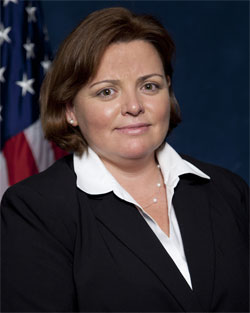Tracy Murrell was a newly minted third mate aboard a 700-foot tanker when she found herself in a front-row seat for a real-life lesson on marine safety off Miami.
It wasn’t a catastrophic collision. The pilot aboard the inbound tanker and the pilot aboard the outbound containership “somehow miscommunicated” just after midnight in a sloppy seaway in the late ’90s. The bows of both ships were scraped and crumpled, but no one was hurt and the cargoes remained intact.
But for Murrell, who became director of the National Transportation Safety Board’s (NTSB) Office of Marine Safety in January, there were things to learn.
“It really solidified my focus on safety,” said Murrell. “It was very early in my career. … And it gave me a very clear picture of how easily and quickly things can go wrong and how extremely important it is to remember that on a daily basis when you are out in the maritime world.”
Murrell, a former executive at Royal Caribbean Cruises Ltd., has spent a good part of her career thinking about things that can go wrong. After graduating from Texas A&M University with a bachelor of science degree in marine transportation, she started out on a generic career path, working for Arco Marine, Maersk Line Ltd. and SeaRiver Maritime, picking up her U.S. Coast Guard master’s license along the way.
But safety and accident prevention — which she had always had an interest in — eventually became her focus. By the time she went to Royal Caribbean, she was ready to take on a role as the company’s expert in safety-related legal cases. She led accident and near-miss investigations, reported on causes and deficiencies and developed safety procedures.
With the addition of an MBA from Nova Southeastern University in Florida, Murrell eventually became associate vice president of marine operations in the U.K. for Royal Caribbean, managing a fleet of more than a dozen ships with a budget exceeding $53 million and a staff of more than 600.
But it was a “different world” living in London and the opportunity to go to work for the NTSB where she could focus exclusively on safety and accident investigation seemed like her dream job.
With a staff of eight, the Office of Marine Safety investigates major marine accidents in U.S. waters, as well as accidents involving U.S.-flagged vessels worldwide. Their reports range from brief summaries of relatively small incidents to tome-sized compilations of major accidents, complete with schematics, videos, computer animations and analyses.
Most of the reports can be found on the NTSB website.
The NTSB sums up its findings with recommendations to shipping companies and the Coast Guard, but they do not carry the force of law — an arrangement set by Congress when the agency was established. Leaving law enforcement to other agencies, members of Congress reasoned, would keep it free from political pressure.
And, that is fine with Murrell, whose personal mission dovetails with the agency’s. “People can prevent accidents by their actions and inactions,” Murrell said. “Keeping a constant focus on what’s going on around you and keeping a constant focus on mentoring and teaching … is key.”

